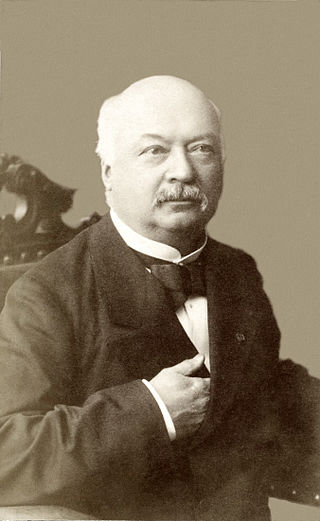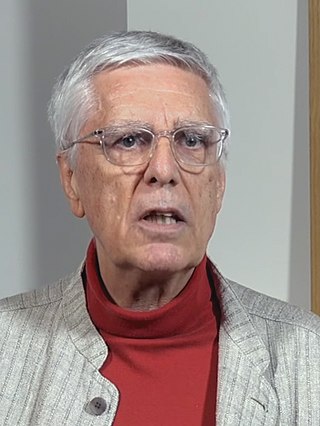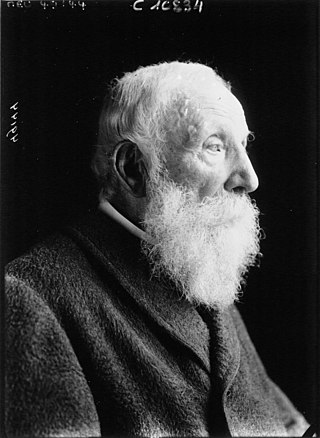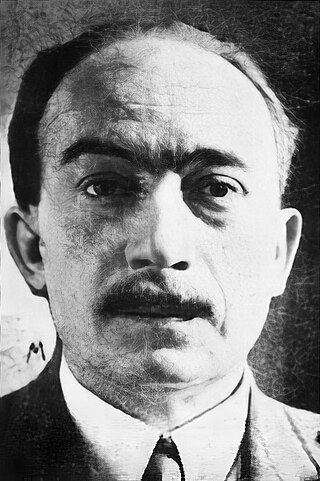Related Research Articles

The University of Paris, metonymically known as the Sorbonne, was the leading university in Paris, France, active from 1150 to 1970, with the exception between 1793 and 1806 under the French Revolution. Emerging around 1150 as a corporation associated with the cathedral school of Notre Dame de Paris, it was considered the second-oldest university in Europe.

Jules Sylvain Zeller was a 19th-century French historian.

Denis Jean Achille Luchaire was a French historian.

Paris-Panthéon-Assas University or Assas University, commonly known as Assas ([asas]) or Paris 2, is a university in Paris, often described as the top law school of France. It is considered as the direct inheritor of the Faculty of Law of Paris, the second-oldest faculty of Law in the world, founded in the 12th century.

Roland Émile Mousnier was a French historian of the early modern period in France and of the comparative studies of different civilizations.

Paris-Sorbonne University was a public research university in Paris, France, active from 1971 to 2017. It was the main inheritor of the Faculty of Humanities of the University of Paris. In 2018, it merged with Pierre and Marie Curie University and some smaller entities to form a new university called Sorbonne University.

Philippe Desan is Howard L. Willett Professor of French and History of Culture at the University of Chicago. Originally from France, Desan is among the top Montaigne scholars alive today. He received his PhD from the University of California Davis (1984), and has published widely on several topics pertaining to the literature and culture of the French Renaissance, often in relation to their economic, political and sociological context. At the University of Chicago, he has served as Master of the Humanities Collegiate Division and as Chair of the Department of Romance Languages and Literatures. He is the general editor of the Montaigne Studies. He has been awarded numerous honors for his scholarly work, including being named Knight of the Ordre des Palmes Académiques (1994) and awarded the Ordre National du Mérite (2004) and the Ordre des Arts et Lettres (2011). He has also received the Prix de l'Académie Française in 2005, the Grand Prix de l'Académie Française for "le rayonnement de la langue et littérature française" in 2015 and the Prix de l'Académie des Sciences Morales et Politiques for his "Montaigne. Une biographie politique" in 2015.

Henri Hauser was a French historian, geographer, and economist. A pioneer in the study of the economic history of the early modern period, he also wrote on contemporary economic issues and held the first chair in economic history to be established at a French university. He was born in Oran into a middle-class Jewish family who had moved to French Algeria for health reasons but returned to France when Hauser was four years old. Hauser was educated at the Lycée Condorcet in Paris and then at the École Normale Supérieure where he came first in both the entrance and leaving examinations. He initially taught in provincial lycées before taking his doctorate in 1892 with a thesis on the 16th-century Huguenot leader, François de la Noue. Hauser went on to become a professor of ancient and medieval history at the University of Clermont-Ferrand, modern history and geography at the University of Dijon, and finally a professor of history and economic history at the Sorbonne from 1919 to 1936. His 1905 book L'impérialisme américain predicted the decline of Europe and the dominance of the United States, while his 1915 Méthodes allemandes d'expansion économique analyzed the role played by German industry in the outbreak of World War I. Hauser was awarded the Legion of Honor in 1919 and in 1945 the Académie française awarded him the Prix de l'Académie for his life's work.

Henry Laurens is a French historian and author of several histories and studies about the Arab-Muslim world. He is Professor and Chair of History of the Contemporary Arab world at the Collège de France, Paris.

The Faculty of Law of Paris, called from the late 1950s to 1970 the Faculty of Law and Economics of Paris, is the second-oldest faculty of law in the world and one of the four and eventually five faculties of the University of Paris, from the 12th century until 1970.

Alfred Jean François Mézières was a French journalist, politician and historian of literature.

Bernard Cottret was a French historian and literary scholar.

François Crouzet CBE was a French historian. Considered the greatest French historian of Britain of his generation, he was Professor Emeritus of Modern History at the Université de Paris-Sorbonne at the time of his death.

Yves-Marie Bercé, is a French historian known for his work on popular revolts of the modern era. He is a member of the Institut de France.
Madeleine Laurain-Portemer was a 20th-century French historian, specializing in the history of Mazarin and his time, married to Jean Portemer (1911-1998).
Élisabeth Crouzet-Pavan or Elisabeth Crouzet-Pavan is a French historian and teacher. She is a professor at the University of Paris-Sorbonne. She is known for her knowledge of Venice in the late Middle Ages.

Émile Mireaux was a French economist, journalist, politician and literary historian. In the 1930s he edited Le Temps and contributed to other right-leaning journals. He became a senator in 1936, and briefly served as a minister in 1940. From 1940 until his death he held a chair in political economy, statistics and finance at the Académie des Sciences Morales et Politiques.

Georges Lacour-Gayet was a French historian who taught at the École Navale and the École Polytechnique. His books on the French navy under Louis XV and Louis XVI are much-quoted and were considered references when published, although they betray his patriotic bias. His master work was a four-volume biography of Talleyrand.
Philippe Levillain was a French historian and academic. He specialized in the history of Catholicism and the papacy and notably wrote a historic encyclopedia of the papacy.
The agrégation externe d'histoire is a French competitive examination for the recruitment of associate professors who teach history or geography at the collège, or lycée level. There is also an agrégation externe de géographie and the agrégation interne d'histoire et géographie. In practice, though not an absolute requirement, it is often used as a selection criterion for teaching history in the CPGE and in higher education.
References
- ↑ Crouzet, Denis. Curriculum vitae. Centre Roland Mousnier. Retrieved 22 March 2019 (in French).
- ↑ Barjot, Dominique (2010). "Hommage François Crouzet". Entreprises et histoire, No. 41, pp. 219-221. Retrieved 27 January 2016 (in French).
- ↑ Harte, Negley (9 June 2010). "Professor François Crouzet: Celebrated anglophile French historian of Britain" The Independent . Retrieved 31 January 2016.
- ↑ British Academy. Fellows: Crouzet, Professor Denis Archived 2016-02-08 at the Wayback Machine . Retrieved 31 January 2016.
- ↑ Journal officiel de la République française (20 April 2014). "Décret du 18 avril 2014 portant promotion et nomination". Retrieved 31 January 2016 (in French).
- ↑ Académie des Sciences Morales et Politiques. Prix Madeleine Laurain-Portemer Archived 2016-07-10 at the Wayback Machine . Retrieved 31 January 2016 (in French).